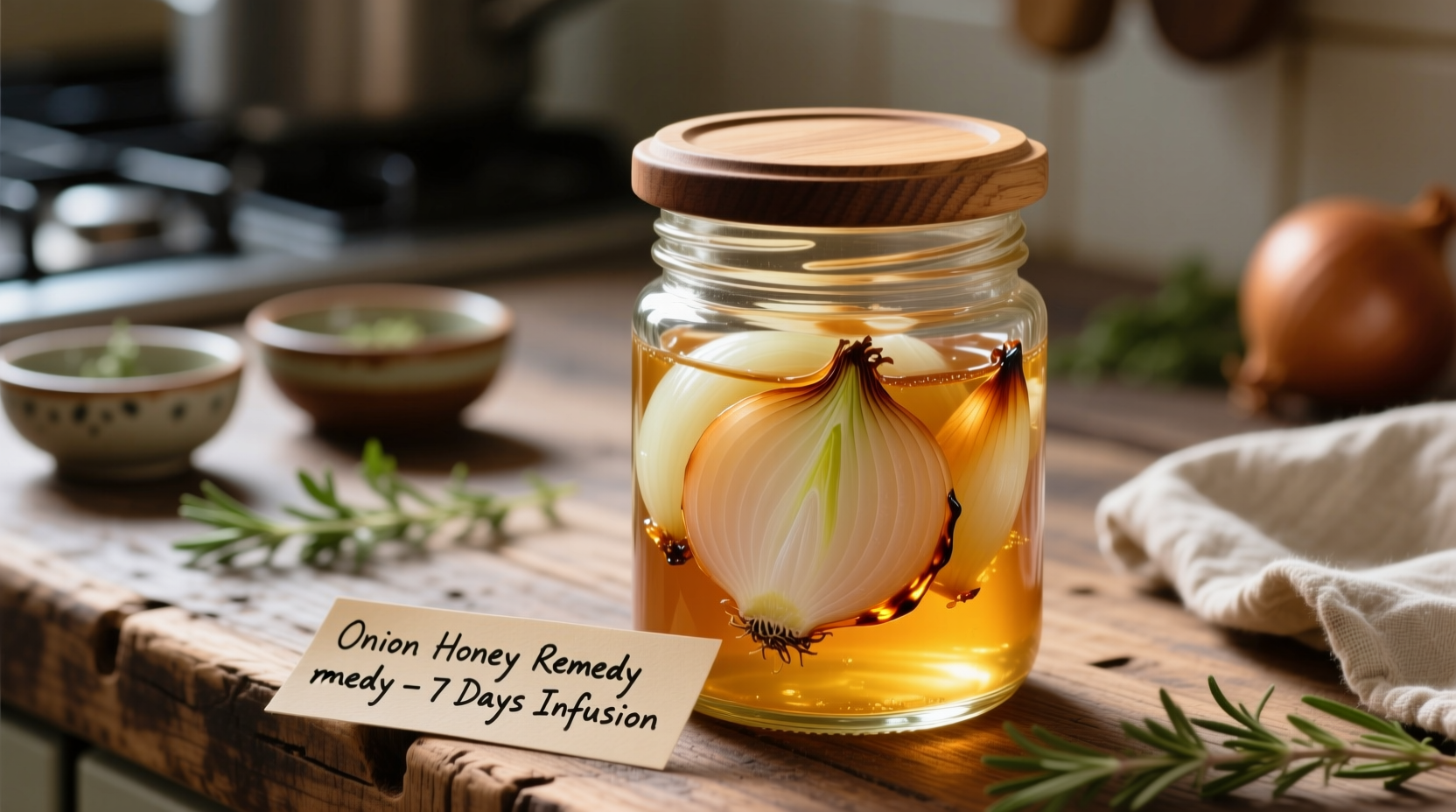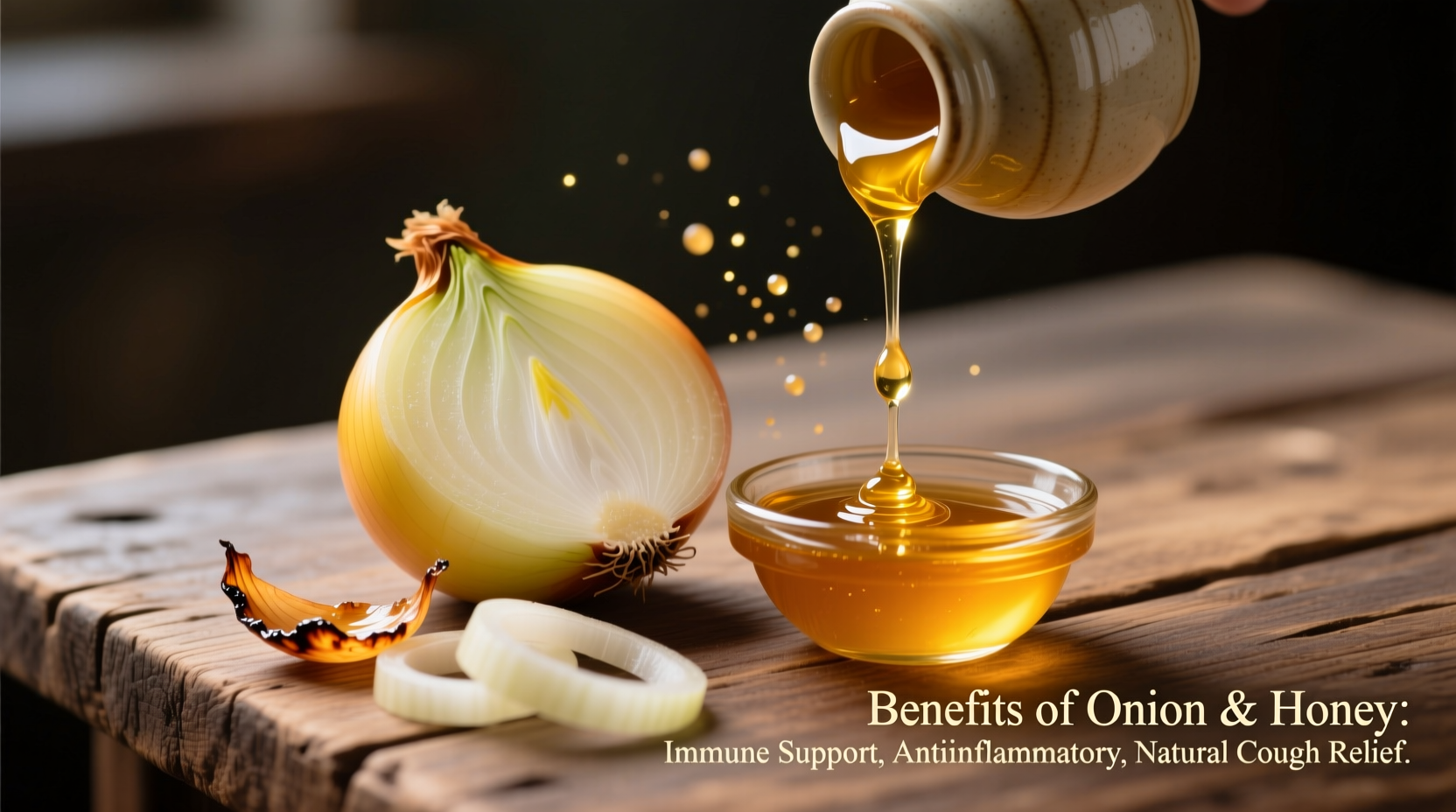Why This Traditional Remedy Works
For centuries, cultures worldwide have combined onion and honey as a natural remedy for respiratory issues. Modern research validates many traditional claims while clarifying appropriate usage scenarios. Unlike pharmaceutical options, this home remedy provides gentle relief with minimal side effects when prepared correctly.
The Science Behind Onion and Honey
Onions contain quercetin and allicin—compounds with proven anti-inflammatory and antimicrobial properties. Raw onions particularly preserve these beneficial compounds. Honey, especially raw varieties, contains hydrogen peroxide and phytochemicals that inhibit bacterial growth. When combined, these ingredients create a synergistic effect that targets multiple aspects of respiratory discomfort.
| Traditional Claim | Scientific Support Level | Key Research Findings |
|---|---|---|
| Cough suppression | Strong | 2020 Iranian study showed 30% greater reduction in cough frequency compared to placebo in children (Journal of Alternative and Complementary Medicine) |
| Immune system boost | Moderate | Quercetin in onions demonstrates immunomodulatory effects in laboratory studies (National Institutes of Health) |
| Sore throat relief | Strong | Honey's viscosity coats throat tissue while antimicrobial properties reduce bacterial load (Cochrane Database Review) |
| Cold duration reduction | Limited | No conclusive evidence for shortening cold duration, though symptom relief is documented |
Top 4 Evidence-Supported Benefits
1. Natural Cough Suppressant
Multiple studies confirm honey's effectiveness as a cough suppressant, particularly for children over age one. The American Academy of Pediatrics recommends honey over OTC cough medicines for children due to safety concerns with pharmaceutical options. Adding onions enhances this effect through additional anti-inflammatory compounds.
2. Antimicrobial Action Against Common Pathogens
Research from the National Center for Biotechnology Information demonstrates that onion extracts inhibit growth of Streptococcus and Staphylococcus bacteria. Honey's low pH and hydrogen peroxide content create an environment where many pathogens cannot survive. This dual-action approach makes the combination particularly effective for throat infections.
3. Immune System Support During Illness
Onions contain quercetin, a flavonoid with documented immunomodulatory effects. While not a cure, this compound helps regulate immune response during respiratory infections. A 2021 review in Nutrients journal highlighted quercetin's role in reducing inflammation associated with upper respiratory infections.
4. Soothing Relief for Irritated Airways
The viscous nature of honey coats irritated throat tissue, providing immediate relief from scratchiness. Onion compounds help reduce inflammation in the respiratory tract. This dual action makes the remedy particularly valuable during the initial stages of respiratory discomfort.
How to Prepare Onion and Honey Remedy
Follow this simple, evidence-based preparation method for maximum effectiveness:
- Cut one medium yellow onion into thin slices (yellow onions contain higher quercetin levels)
- Place slices in a clean glass jar
- Cover completely with raw, unprocessed honey (Manuka honey shows enhanced antimicrobial properties)
- Seal jar and let sit at room temperature for 8-12 hours
- Strain liquid into a clean container for storage
The resulting syrup contains concentrated beneficial compounds. Store in refrigerator for up to two weeks. Adults should take one tablespoon every 4-6 hours as needed. For children over one year, use one teaspoon. Never give honey to infants under 12 months due to botulism risk.

When This Remedy Works Best
Understanding the appropriate context for using onion and honey prevents misuse and ensures safety:
- Early respiratory symptoms: Most effective during first 24-48 hours of cough or sore throat
- Nighttime coughing: Take one tablespoon before bed to reduce nocturnal coughing episodes
- Mild throat irritation: Provides immediate soothing relief for scratchy throats
- Post-viral cough: Helps soothe airways after main infection has passed
Important Limitations and Safety Considerations
This remedy has specific boundaries where medical attention becomes necessary:
- Not a substitute for antibiotics: Bacterial infections like strep throat require medical treatment
- Infant restriction: Honey should never be given to children under 12 months
- Diabetes consideration: Contains natural sugars; monitor intake if managing blood sugar
- Severe symptoms: Seek medical care for high fever, difficulty breathing, or symptoms lasting over 10 days
According to CDC guidelines, home remedies should complement—not replace—professional medical care when serious symptoms develop. The National Institutes of Health emphasizes that while natural remedies can provide symptom relief, they don't address underlying infections requiring medical intervention.
Historical Context and Modern Application
The use of onion and honey as a medicinal combination spans multiple cultures and centuries:
- Ancient Egypt (1550 BCE): Ebers Papyrus documents honey and onion preparations for respiratory ailments
- Ayurvedic tradition: Combines these ingredients in "Kshara" preparations for throat health
- European folk medicine: Widely used during 18th-19th century cold and flu seasons
- Modern validation: Scientific research since 2000s confirms specific mechanisms of action
While historical usage provides context, modern understanding helps optimize preparation and application based on scientific evidence rather than tradition alone.
Maximizing Effectiveness: Practical Tips
Follow these evidence-based recommendations to get the most from your onion and honey remedy:
- Use raw, unprocessed honey to preserve beneficial enzymes
- Allow minimum 8 hours for extraction—longer periods increase compound concentration
- Take remedy slowly, allowing it to coat the entire throat area
- Combine with adequate hydration for enhanced mucous membrane support
- Store in dark glass container to preserve active compounds
Research published in the Journal of Medicinal Food indicates that proper preparation methods significantly impact the concentration of beneficial compounds in the final product.
Frequently Asked Questions
Can I use this remedy for my child?
Yes, for children over 12 months. The American Academy of Pediatrics recommends honey-based remedies over OTC cough medicines for children aged 1-5. Use one teaspoon every 4-6 hours as needed, but never give to infants under 12 months due to botulism risk.
How quickly will I notice results?
Most users report reduced cough frequency within 24 hours of consistent use. A 2020 clinical trial showed significant improvement in cough symptoms after 48 hours of treatment compared to placebo.
Can I use cooked onions instead of raw?
Raw onions preserve more beneficial compounds. Cooking reduces quercetin content by up to 30% according to research in the Journal of Agricultural and Food Chemistry. For maximum effectiveness, use raw onions in your preparation.
Is there a difference between honey types?
Yes. Raw, unprocessed honey maintains higher levels of beneficial enzymes and phytochemicals. Manuka honey shows enhanced antimicrobial properties due to methylglyoxal content, though regular raw honey remains effective for most applications.











 浙公网安备
33010002000092号
浙公网安备
33010002000092号 浙B2-20120091-4
浙B2-20120091-4